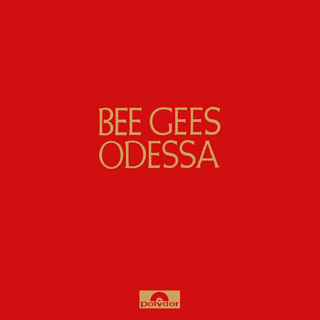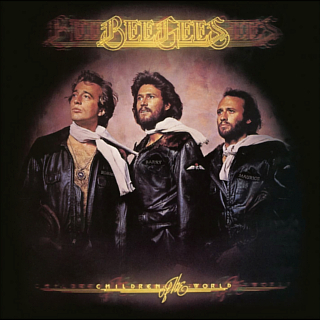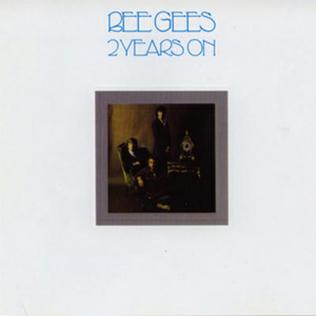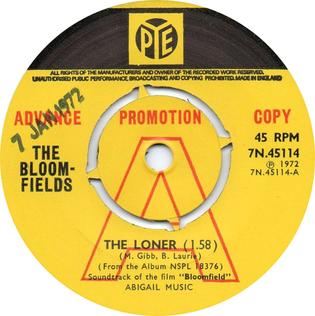Related Research Articles

The Bee Gees were a musical group formed in 1958 by brothers Barry, Robin, and Maurice Gibb. The trio were especially successful in popular music in the late 1960s and early 1970s, and later as prominent performers in the disco music era in the mid- to late 1970s.

Robin Hugh Gibb was a British singer and songwriter. He gained worldwide fame as a member of the Bee Gees with elder brother Barry and fraternal twin brother Maurice. Robin Gibb also had his own successful solo career. Their youngest brother Andy was also a singer.

Maurice Ernest Gibb was a British musician. He achieved worldwide fame as a member of the pop group Bee Gees. Although his elder brother Barry Gibb and fraternal twin brother Robin Gibb were the group's main lead singers, most of their albums included at least one or two songs featuring Maurice's lead vocals, including "Lay It on Me", "Country Woman" and "On Time". The Bee Gees are one of the most successful pop-rock groups of all time.

Sir Barry Alan Crompton Gibb is a British musician, singer, songwriter and record producer. He rose to worldwide fame as a member of the Bee Gees, with his younger brothers, Robin and Maurice Gibb, one of the most commercially successful groups in the history of popular music.

Cucumber Castle is the seventh studio album by the Bee Gees, released in April 1970. It was produced by Barry Gibb, Maurice Gibb, and Robert Stigwood. It consists of songs from their television special of the same name, which was named after a song on their 1967 album Bee Gees' 1st. Cucumber Castle is the only Bee Gees album not to feature any recorded contributions from Robin Gibb, as he had left the group before the album was recorded.

Odessa is the sixth studio album by the Bee Gees, a double vinyl LP released in February 1969, initially in an opulent red flocked cover with gold lettering. Despite reaching the UK Top Ten and the US Top 20, the album was not particularly well-received, though now is regarded by many as the most significant of the group's Sixties albums. An ambitious project, originally intended as a concept album on the loss of a fictional ship in 1899, it created tension and disagreements in the band regarding the work's direction; finally, a dispute over which song to release as a single led to Robin Gibb temporarily leaving the group.

Children of the World is a 1976 album by the Bee Gees. The first single, "You Should Be Dancing", went to No. 1 in the US and Canada, and was a top ten hit in numerous other territories. It was the group's fourteenth album. The album was re-issued on CD by Reprise Records and Rhino Records in 2006. This was the first record featuring the Gibb-Galuten-Richardson production team which would have many successful collaborations in the following years.

Horizontal is the fourth studio album by the Bee Gees, and their second album to receive an international release. The LP was released in early 1968, and included the international hit singles "Massachusetts" and "World". On 5 February 2007, Reprise Records reissued Horizontal with both stereo and mono mixes on one disc and a bonus disc of unreleased songs, non-album tracks, and alternate takes. The album was released in Polydor in many countries and on Atco only in the US and Canada. "And the Sun Will Shine" was released as a single only in France. The influences displayed on the album range from the Beatles to baroque pop.

2 Years On is the eighth studio album by the Bee Gees, which reached No. 32 on the US charts. Released in 1970, the album saw the return of Robin Gibb to the group after an earlier disagreement and subsequent split following Odessa. 2 Years On was the first album with drummer Geoff Bridgford, who remained a full-time member of the group until 1972 although he was not pictured on the sleeve. The best-known track is "Lonely Days". Released as the first single by the reunited brothers, it charted high in the US, but peaked at No. 33 in the United Kingdom.

"Don't Forget to Remember" also called "Don't Forget to Remember Me" is a country ballad recorded by the Bee Gees, from the album Cucumber Castle. The song was written by Barry and Maurice Gibb. It was produced by the band with Robert Stigwood.
"World" is a song by the Bee Gees, released in 1967 as a single in the United Kingdom and Europe and then included on their album Horizontal the following year. Though it was a big hit in Europe, Atco Records did not issue it as a single in the United States, having just issued a third single from Bee Gees' 1st, "Holiday".

"First of May" is a song by the Bee Gees with lead vocals by Barry Gibb, released as a single from their 1969 double album Odessa. Its B-side was "Lamplight". It also featured as the B-side of "Melody Fair" when that song was released as a single in the Far East in 1971 as well as in 1976 and 1980 on RSO Records. It was the first Bee Gees single to be released after lead guitarist Vince Melouney had left the group.

"I.O.I.O." is a song by the Bee Gees, released on the album Cucumber Castle. It was written by Barry and Maurice Gibb. The song was released as a single in March 1970, and was also one of the highlights of the album. The single was a relative success mainly on European charts. Its music video is taken from the film Cucumber Castle.

"My World" is a 1972 single released by the Bee Gees. It was originally released as a non-album single on 14 January 1972 worldwide. but was later included on the compilation Best of Bee Gees, Volume 2 in 1973. The flip side of the single was "On Time", a country rock number composed by Maurice Gibb. "My World" reached the Top 20 in both US and UK.

"Boogie Child" is the third hit single from the Bee Gees' 1976 platinum album Children of the World, released in the US in early 1977. The song peaked at no. 12 on the Billboard Hot 100 as an A-side and was then used as the B-side of the single "Children of the World" in the UK. It was the last song recorded by the Bee Gees for their album Children of the World.

"(Our Love) Don't Throw It All Away" is a song penned by Barry Gibb and Blue Weaver and recorded by the Bee Gees in 1977 on the Saturday Night Fever sessions but was not released until Bee Gees Greatest (1979). A different version was released in September 1978 as the third single by Andy Gibb from his second studio album Shadow Dancing.
"Kitty Can" is a song by the Bee Gees, composed by Barry, Robin and Maurice Gibb. It was released as the B-side of "I've Gotta Get a Message to You" in July 1968, and as the second track on the album Idea in September 1968. In 1973, RSO Records released a compilation called Kitty Can only in Argentina and Uruguay, and this song appeared as the first track on that album.

"Morning of My Life" is a song written by Barry Gibb in 1965 whilst in the town of Wagga Wagga, Australia and later recorded by the Bee Gees and several other artists. It was recorded in 1966 during sessions for the album Spicks and Specks, and later was released as the opening track on the compilation Inception/Nostalgia in 1970. The first recording of the song to be released by any artist was by Ronnie Burns, first as a B-side to his Exit, Stage Right single in June 1967 and a month later on his Ronnie LP.

"The Loner" is a song written by Maurice Gibb and Billy Lawrie and originally included on Gibb's The Loner which was not released, although British rock band The Bloomfields covered the song and their version was released internationally, featuring a lead vocal of Billy Lawrie and Maurice Gibb, with Gibb on guitars and bass. They recorded this song for the film Bloomfield, but the film was called The Hero in America. The song starts with a drum fill. Gibb and Lawrie sang together in harmony on the line I'm a loner. On the record, Billy Lawrie was credited as 'B. Laurie'.
"One Bad Thing" is a song written by Barry Gibb in 1969 with Maurice Gibb. It was recorded by Barry Gibb for his unreleased debut solo LP The Kid's No Good. The song was originally credited to Barry and Maurice, but the other versions have been credited to Barry alone.
References
- 1 2 3 4 5 6 7 Brennan, Joseph. "Gibb Songs: 1967" . Retrieved 22 May 2013.
- 1 2 3 4 5 6 7 8 9 Brennan, Joseph. "Gibb Songs: 1968" . Retrieved 22 May 2013.
- 1 2 3 4 5 6 7 8 9 10 11 12 13 Brennan, Joseph. "Gibb Songs: 1969" . Retrieved 22 April 2013.
- 1 2 3 4 5 6 7 8 9 10 11 Brennan, Joseph. "Gibb Songs: 1970" . Retrieved 8 August 2013.
- 1 2 3 4 5 6 7 8 9 10 11 12 13 14 15 16 Brennan, Joseph. "Gibb Songs: 1971" . Retrieved 8 November 2013.
- 1 2 3 Brennan, Joseph. "Gibb Songs: 1972" . Retrieved 30 January 2015.
- ↑ Brennan, Joseph. "Gibb Songs: 1973" . Retrieved 30 January 2015.
- 1 2 3 Brennan, Joseph. "Gibb Songs: 1975" . Retrieved 30 January 2015.
- 1 2 Brennan, Joseph. "Gibb Songs: 1976" . Retrieved 30 January 2015.
- ↑ Brennan, Joseph. "Gibb Songs: 1978" . Retrieved 30 January 2015.
- ↑ "Bee Gees - City Of Angels". YouTube . Retrieved 30 January 2015.
- 1 2 3 4 5 6 7 Brennan, Joseph. "Gibb Songs: 1981" . Retrieved 30 January 2015.
- ↑ Brennan, Joseph. "Gibb Songs: 1987" . Retrieved 30 January 2015.